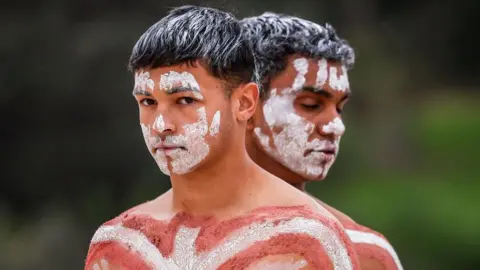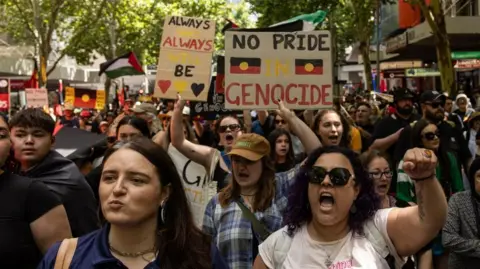Inquiry finds British committed genocide on Indigenous Australians
 Getty Images
Getty ImagesBritish colonists committed genocide against Australia's Indigenous population in Victoria, a landmark Aboriginal-led inquiry has found.
The Yoorrook Justice Commission found violence and disease reduced the local Indigenous population by three quarters in the 20 years after the state was colonised, in the early 1830s.
Its report included 100 recommendations to "redress" harm caused by "invasion and occupation" - though several of the authors disagreed with unspecified "key findings".
The Commission was set up in 2021 as Australia's first formal "truth-telling" inquiry, and tasked with examining past and ongoing "systemic injustices" suffered by the Indigenous people in the state.
It is part of a wider national push for Australia to engage in a reconciliation process with Aboriginal and Torres Strait Islander people, which community leaders say should include inquiries into the nation's history, treaty-making, and granting First Nations people greater political say.
Held over four years, The Yoorrook Justice Commission gave Aboriginal and Torres Strait Islander people the opportunity to formally share their stories and experiences.
The commission's brief covered a wide gamut of issues including land and water rights, cultural violations, killing and genocide, health, education and housing.
 EPA
EPAThe report found that from 1834, "mass killings, disease, sexual violence, exclusion, linguicide, cultural erasure, environmental degradation, child removal" as well as assimilation contributed to the "near-complete physical destruction" of Victoria's Indigenous community.
The population dropped from 60,000 to 15,000 by 1851.
"This was genocide," the report said.
The report, which drew from more than two months of public hearings and over 1,300 submissions, called for "redress" to acknowledge a range of human rights violations, which could include reparations.
Among its other recommendations were a significant overhaul of the education system to include greater input from Indigenous people, and a government apology for Aboriginal soldiers who served during the world wars and were excluded from a scheme gifting diggers land when they returned from the battlefields.
On the state's health system, the report found that racism was "endemic" and called for more funding for Indigenous health services and policies to get more Aboriginal staff in the system.
Three of the five commissioners - Sue-Anne Hunter, Maggie Walter and Anthony North - "did not approve of the inclusion of the key findings in the final report", however no further detail was provided.
In response to the report, Victoria's Labor government said it would "carefully consider" the findings, with Premier Jacinta Allan saying they "shine a light on hard truths".
Jill Gallagher, head of Victoria's peak body for Aboriginal health and wellbeing, said the genocide finding was "indisputable".
"We don't blame anyone alive today for these atrocities," she told the ABC, "but it is the responsibility of those of us alive today to accept that truth - and all Victorians today must accept, recognise and reconcile with these factual findings."
The commission's report is the first of its kind in Australia, though similar inquiries are happening in other states and territories with varying degrees of progress, depending on which party is in government.
For example, in Queensland, a truth-telling inquiry was cancelled after the Labor government was replaced by a new Liberal-National government.
In recent years, the national dialogue on how to recognise the traditional owners of Australia at all levels of governments has prompted heated debate.
Australians voted against a historic referendum in October 2023, rejecting a change to the constitution that would have created an Aboriginal and Torres Strait Islander Voice, a national body for Indigenous people to give advice on laws.
